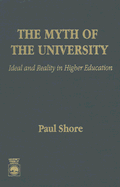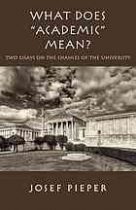Busch, L. (2017). Knowledge for sale: The neoliberal takeover of higher education. Cambridge, MA: MIT Press.
 This timely volume critiques the effect of relying on market forces, the main tenant of Neoliberalism, on higher education. None of these factors are new, but Busch brings them together under the mantra of “neoliberalism” and argues that collectively they represent a crisis for both higher education and society. Continue reading “Knowledge for Sale”
This timely volume critiques the effect of relying on market forces, the main tenant of Neoliberalism, on higher education. None of these factors are new, but Busch brings them together under the mantra of “neoliberalism” and argues that collectively they represent a crisis for both higher education and society. Continue reading “Knowledge for Sale”
 Two Canadian faculty members in the humanities take inspiration from the “slow food” movement and apply a similar concept of resisting corporatization to academia. The “slow professor manifesto … challenges the frantic pace and standardization of contemporary culture”. This book is a “must read” for faculty and administrators.
Two Canadian faculty members in the humanities take inspiration from the “slow food” movement and apply a similar concept of resisting corporatization to academia. The “slow professor manifesto … challenges the frantic pace and standardization of contemporary culture”. This book is a “must read” for faculty and administrators.  This book tells a story about “systematically inviting and supporting reflection about life’s purpose [an initiative funded by the Lilly Endowment’s Programs for the Theological Exploration of Vocation, PTVE] on dozens of college and university campuses, and among thousands of students, faculty, and staff”.
This book tells a story about “systematically inviting and supporting reflection about life’s purpose [an initiative funded by the Lilly Endowment’s Programs for the Theological Exploration of Vocation, PTVE] on dozens of college and university campuses, and among thousands of students, faculty, and staff”.  This brief book (“broadside”) is a sobering account of the rising costs of higher education, and the heights reached by student educational indebtedness. Reynolds describes this as an unsustainable “bubble” similar to the recent housing bubble (and equally likely to crash).
This brief book (“broadside”) is a sobering account of the rising costs of higher education, and the heights reached by student educational indebtedness. Reynolds describes this as an unsustainable “bubble” similar to the recent housing bubble (and equally likely to crash).  The author is a professor of English and History at Cambridge University, and the book is primarily from a British, secular and research institution perspective. But it is interesting to compare the issues he discusses with those in US Catholic higher education. Of particular note, Collini discusses Newman’s “ideal university” in a contemporary light. It is a highly readable and provocative book.
The author is a professor of English and History at Cambridge University, and the book is primarily from a British, secular and research institution perspective. But it is interesting to compare the issues he discusses with those in US Catholic higher education. Of particular note, Collini discusses Newman’s “ideal university” in a contemporary light. It is a highly readable and provocative book.  This book does not focus on Catholic universities, but rather the place of religion generally in any university. The authors address ways that “religion” (broadly defined) can successfully be incorporated on modern campuses. Their book is “not about the eternal truths of heaven, it is about the place of religion in the rough-and-tumble educational realities of the here and now”.
This book does not focus on Catholic universities, but rather the place of religion generally in any university. The authors address ways that “religion” (broadly defined) can successfully be incorporated on modern campuses. Their book is “not about the eternal truths of heaven, it is about the place of religion in the rough-and-tumble educational realities of the here and now”.  Arthur examines the trend for religious colleges and universities to become more “mainstream” in response to modernity and, for Catholic institutions, especially in response to Vatican II. Much of the Catholic response is covered in other readings , but Arthur’s work is informative in placing it in broader comparative context.
Arthur examines the trend for religious colleges and universities to become more “mainstream” in response to modernity and, for Catholic institutions, especially in response to Vatican II. Much of the Catholic response is covered in other readings , but Arthur’s work is informative in placing it in broader comparative context.  Reuben’s work examines development of the American university during the late 19th and early 20th centuries, especially the roles of religion and morality. Her socio-historical analysis is dominated by the prevailing American Protestantism, and its focus is primarily larger research universities However, many of the trends that Reuben identifies affected the development of Catholic universities.
Reuben’s work examines development of the American university during the late 19th and early 20th centuries, especially the roles of religion and morality. Her socio-historical analysis is dominated by the prevailing American Protestantism, and its focus is primarily larger research universities However, many of the trends that Reuben identifies affected the development of Catholic universities.  This is an interesting and readable book, and although it was not well reviewed (largely on account of being impractical, and perceived as elitist and reactionary) I felt the author made some important points. At the crux is the dialectic between the university as an intellectual “community of scholars” (with a nostalgic look back to medieval times) and the socio-political reality of universities as training for profitable employment and the entry of universities into a competitive marketplace.
This is an interesting and readable book, and although it was not well reviewed (largely on account of being impractical, and perceived as elitist and reactionary) I felt the author made some important points. At the crux is the dialectic between the university as an intellectual “community of scholars” (with a nostalgic look back to medieval times) and the socio-political reality of universities as training for profitable employment and the entry of universities into a competitive marketplace.